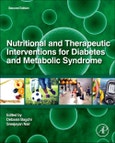Nutritional and Therapeutic Interventions for Diabetes and Metabolic Syndrome, Second Edition, provides an overview of the current diabetes epidemic, outlines the consequences of this crisis, and lays out strategies to forestall and prevent diabetes, obesity and other intricate issues of metabolic syndrome. Contributing experts provide up-to-date global approaches to the critical consequences of metabolic syndrome and make the book an important reference for those working with the treatment, evaluation or public health planning for the effects of metabolic syndrome and diabetes.
Completely revised with 15 new chapters, the book includes coverage of the roles of gut microbiome in obesity and diabetes, macrovascular and microvascular complications, diabetes, metabolic syndrome and kidney disease, aspects of diabetic cardiomyopathy, diabetes, Alzheimer's and neurodegenerative diseases, roles of SGLT2 inhibitors in the treatment of type 2 diabetes, novel biomarkers in diabetes, roles of Trigonella foenum-graecumseed extract in type 2 diabetes, beneficial effects of chromium (III) and vanadium supplements in diabetes, prevention of type 1 diabetes, novel drugs in the therapeutic intervention of type 2 diabetes, eHealth and mobile apps for self-management, artificial pancreatic transplantation, non-invasive glucose monitoring, and the app for glucose regulation.
Table of Contents
I. EPIDEMIOLOGY AND OVERVIEW 1. Type 1 Diabetes Mellitus: An Overview SALEH ADI AND ANDREA GERARD GONZALEZ 2. Prediabetes: Prevalence, Pathogenesis, and Recognition of Enhanced Risk ALOK K. GUPTA, AJAY MENON, MEGHAN BRASHEAR AND WILLIAM D. JOHNSON 3. Targeting Prediabetes to Preempt Diabetes SREEDHARAN N, MAHADEV RAO AND SONAL SEKHAR M 4. Obesity and Type 2 Diabetes in Youths: New Challenges to Overcome NICOLA SANTORO, COSIMO GIANNINI AND SONIA CAPRIO 5. Roles of Environmental Pollution and Pesticides in Diabetes and Obesity: The Epidemiological Evidence CHARLES J. EVERETT, DANIRA MEDUNJANIN AND IVAR L. FRITHSEN 6. An Overview of the Roles of the Gut Microbiome in Obesity and Diabetes GILLIAN M. BARLOW, EUGENIA A. LIN AND RUCHI MATHUR
II. TYPES OF DIABETES AND ITS CORRELATION WITH OTHER DISEASES 7. Role of Peripheral Neuropathy in the Development of Foot Ulceration and Impaired Wound Healing in Diabetes Mellitus FRANCESCO TECILAZICH AND ARISTIDIS VEVES 8. The Association of Diabetes in the Onset of Dementia in the Elderly Population: An Overview ABHAI KUMAR AND SMITA SINGH 9. The Role of Insulin Resistance in the Cardiorenal Syndrome ADAM WHALEY-CONNELL AND JAMES R. SOWERS 10. An Overview on Diabetic Nephropathy KEI FUKAMI AND SHO-ICHI YAMAGISHI 11. An Overview of Diabetic Retinopathy SHINTARO NAKAO, SHIGEO YOSHIDA AND KOH-HEI SONODA 12. An Overview of Gestational Diabetes CHRISTOPHER FEDERICO AND GABRIELLA PRIDJIAN 13. Diabetes, a Potential Threat to the Development and Progression of Tumor Cells in Individuals SAYANTAN MAITRA, STABAK DAS AND PRADIPTA BANERJEE
III. MOLECULAR INSIGHTS OF DIABETES AND METABOLIC SYNDROME 14. Lipid-Induced Insulin Resistance: Molecular Mechanisms and Clinical Implications SATINATH MUKHOPADHYAY, DEEP DUTTA AND DIPYAMAN GANGULY 15. Gene-Environment Interaction in the Pathogenesis of Type 2 Diabetes KIAN-PENG GOH 16. Renal Sodium-Glucose Transporter-2 Inhibitors and Antidiabetic Agents ANAND S. NAIR, DEBASIS BAGCHI AND SREEJAYAN NAIR 17. Emerging Role of MicroRNA in Diabetes Mellitus ANAND S. NAIR AND DEBASIS BAGCHI
IV. PATHOPHYSIOLOGY 18. Insulin Resistance Syndrome: A Crucial Example Where a Physiological Continuum of Risks Needs Attention HARRY G. PREUSS 19. Sleep Disturbances, Hypertension, and Type 2 Diabetes MICHELLE A. MILLER AND FRANCESCO P. CAPPUCCIO 20. Roles of Pancreatic Cell Function, Liver, Skeletal Muscle, and Adipose Tissue in Diabetes and the Metabolic Syndrome BEVERLY S. MÜHLHÄUSLER 21. Glycemic Variability and Its Clinical Implications NARSINGH VERMA 22. Diabetic Wound Inflammation SCOTT CHAFFEE, AMITAVA DAS, SUMAN SANTRA AND SASHWATI ROY 23. Sarcopenia, Diabetes, and Nutritional Intervention SHEILA M. WICKS, IVAN SALAMON, ANGELA I. CALDERON, ESPERANZA CARCACHE DE BLANCO AND GAIL B. MAHADY
V. PREVENTION AND TREATMENT 1: DIET, EXERCISE, SUPPLEMENTS AND ALTERNATIVE MEDICINES 24. Dietary Polyphenols, Gut Microbiota, and Intestinal Epithelial Health MEIJUN ZHU 25. Reducing the Risk of Diabetes and Metabolic Syndrome With Exercise and Physical Activity DAWN BLATT AND CHERI L. GOSTIC 26. Nutraceutical Impact on the Pathophysiology of Diabetes Mellitus ODETE MENDES, LEE KOETZNER AND JAYSON CHEN 27. Therapeutic Effect of Fucoxanthin on Metabolic Syndrome and Type 2 Diabetes KAZUO MIYASHITA, SHOW NISHIKAWA AND MASASHI HOSOKAWA 28. Safety and Antidiabetic Efficacy of a Novel Trigonella foenum-graecum Seed Extract ANAND SWAROOP, MANASHI BAGCHI, HARRY G. PREUSS AND DEBASIS BAGCHI 29. Beneficial Effects of Chromium(III) and Vanadium Supplements in Diabetes JOHN B. VINCENT 30. Protective Role of Alpha-Tocopherol in Diabetic Nephropathy DAIKI HAYASHI AND YASUHITO SHIRAI 31. Antidiabetic Activity of Curcumin: Insight Into Its Mechanisms of Action MARZENA WOJCIK, MICHAL KRAWCZYK AND LUCYNA A. WOZNIAK 32. Meal Plans for Diabetics: Caloric Intake, Calorie Counting, and Glycemic Index PAULIN MOSZCZYNSKI AND ZBIGNIEW TABAROWSKI
VI. PREVENTION AND TREATMENT 2: DRUGS AND PHARMACEUTICALS 33. The Evolution of Glucose-Lowering Drugs for Type 2 Diabetes ANDREW J. KRENTZ AND ALAN J. SINCLAIR 34. Current Antidiabetic Drugs: Review of Their Efficacy and Safety MD. AKIL HOSSAIN AND ROKEYA PERVIN 35. HDACs in Diabetes: A New Era of Epigenetic Drug LUÍS F. SCHÜTZ, MIN HI PARK AND MAHUA CHOUDHURY
VII. NOVEL INNOVATIONS 36. Noninvasive Blood Glucose Measurement YASUHIRO UWADAIRA AND AKIFUMI IKEHATA
VIII. DIABETES IN ANIMALS AND TREATMENT 37. Diabetes Mellitus in Animals: Diagnosis and Treatment of Diabetes Mellitus in Dogs and CatsDEBORAH S. GRECO








